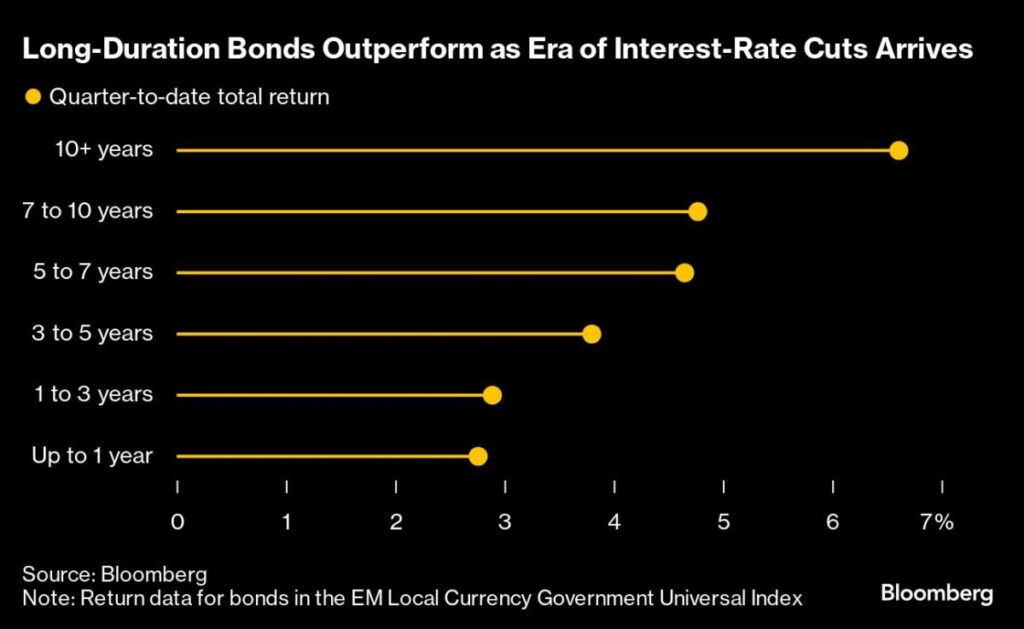(Bloomberg) — JPMorgan Asset Management, Van Eck Associates Corp. and Vontobel Asset Management are betting that the billions of dollars pulled from emerging markets will start coming back as US borrowing costs drop.
Most Read from Bloomberg
Debt denominated in local currencies should advance the most, they say, as emerging-market central banks look to follow the Federal Reserve’s path. Longer-dated bonds are seen leading the rally.
“Duration will become the target,” Pierre-Yves Bareau, head of emerging-market debt at JPMorgan Asset Management in London, said in an interview. “Asia is of interest when we talk about engaging in duration.”
Traders are increasing wagers the Fed will deliver a half-point interest-rate cut on Wednesday, just days after that bet seemed all but over.
Improved risk appetite as borrowing costs drop may draw money into emerging-market assets, according to Gramercy Funds Management, ending a period of stress that saw investors park cash in the safety of US bonds. EM bond funds lost $153 billion since the beginning of 2022, according to EPFR data.
Growth in the developing world remains strong, according to JPMorgan Chase & Co., which recommended an overweight position in EM local-currency debt last week. By then, the asset class lagged the rally in Treasuries by 68 basis points since late May as US swap markets priced in easier policy, analysts led by Saad Siddiqui wrote.
The outlook for currencies is murkier as central banks’ easing erodes carry and concerns over a recession in the US may trigger a flight to safety and propel the greenback, Barclays strategists led by Andrea Kiguel wrote in a note Thursday. Currencies from Colombia, Hungary, Mexico and South Africa may require more caution, Barclays said.
Here’s a look at how the aftermath of the Fed decision may play out across various emerging markets around the globe.
EMEA
Debt issued by countries with strong credit metrics in eastern Europe are better positioned to weather an economic downturn, according to Grant Webster, who oversees emerging-market sovereigns and currencies at Ninety One.
“Global activity is easing, US economy is easing, which makes us more cautious on high-yielding currency and bond markets especially if the slowdown in EM countries accelerates,” Webster said in an interview, adding he’s also overweight local-currency debt.
Poland, which has kept borrowing costs unchanged for almost a year, is one of the nations looking at the Fed as a cue, considering easing in the US as a potential trigger to start rate cuts next year. Hungary, which paused its easing in August, is also looking closely at emerging-market reaction to the Fed and ECB.
JPMorgan’s Bareau, who manages about $50 billion in emerging-market fixed income, favors debt from South Africa, where political uncertainty has diminished after a surprise election result in May.
Asia
Beleaguered Asian currencies stand to gain as the Bank of Japan bucks the global trend, raising interest rates and boosting the yen. The hike sparked an unwinding of carry trades, in which investors borrow in low-yielding currencies like the yen to buy others with high interest rates.
While the pullback in carry trades is hurting many emerging markets elsewhere, the yen’s appreciation will boost Asian currencies, said Thierry Larose, an investor at Vontobel Asset Management, who favors the Korean won.
“Over the short term, it was a negative for markets,” said Larose, whose firm managed €3.4 billion ($3.8 billion) at the end of June. “But longer term we think that at least now the Japanese yen is starting to appreciate, again, that will probably unlock the value potential of some other Asian currencies.”
Latin America
Latin America, meanwhile, is facing investor backlash amid policy uncertainty in the region’s two largest economies. Pain from a global slowdown would also hit the commodity-rich region the hardest, investors say, diminishing the potential gains from any Fed-induced rally.
“Looking at Latin American currencies one by one, there is either something off with the idiosyncratic story or not enough carry cushion,” said Olga Yangol, head of emerging-market research and strategy at Credit Agricole, who favors longs in the Taiwanese dollar and Indonesian rupiah.
In Mexico, the new legislature — controlled by the ruling party — is passing constitutional changes that critics say will erode the government’s checks and balances.
The region’s central banks, who led the world in tightening policy after the pandemic shock, have also led easing campaigns, leaving little room left for trades on more cuts.
“There’s little money to be made betting on policy rate cuts at the front ends of curves as they are largely priced, but plenty of potential for profits from market rates rallying along their yield curves,” according to David Austerweil, an emerging-markets money manager at Van Eck in New York.
Brazil’s central bank is actually gearing up to hike — a decision due just hours after the Fed’s — as President Luiz Inacio Lula da Silva’s ambitious spending plans take a toll on inflation expectations.
Some money managers are anticipating an even more thorough reallocation of assets to follow after the US elections in November.
“Investors into EM will be doing a much deeper dive post the first week of November as opposed to allocating additional assets in the lead up and trying to make a call on that event,” said Arif Joshi, an investor at Lazard Asset Management, who favors long duration debt denominated in hard currency.
–With assistance from Davison Santana, Tugce Ozsoy and Srinivasan Sivabalan.
Most Read from Bloomberg Businessweek
©2024 Bloomberg L.P.
Read the full article here

